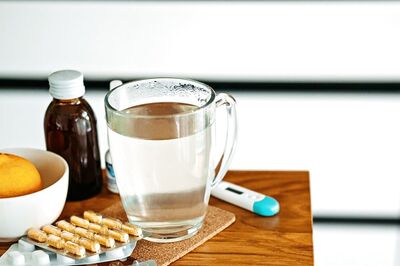
views
How to Get Korean Glass Skin
Double-cleanse your face with oil- and water-based cleansers. Double-cleansing is washing your face in two steps instead of one. In the first step, use an oil-based cleanser to lift makeup, sebum, dirt, and pollution from your skin. Then, wash your face with a water-based foaming cleanser to remove whatever you lifted in the first step. Choose a cleansing oil, balm, or cream for your first cleanse. Micellar water is also a good choice. For the second cleanse, look for creamy, water-based cleansers with a low pH and the word “gentle” on the packaging for your second cleanse. Repeat this entire routine in the morning and at night (except for sunscreen). Board-Certified Dermatologist Paul Friedman recommends washing your face twice a day to help remove the debris and the oil that accumulates on your skin throughout the day.
Use a gentle chemical exfoliator. Exfoliate your face to remove dead skin and even out your skin’s texture. It also helps the rest of your skincare products sink into your skin. A chemical exfoliator with retinoids, glycolic acid, or lactic acid is generally gentler on your skin than a physical exfoliator like a cleansing brush or sugar scrub. Board-Certified Dermatologist and Dermatopathologist Margareth Pierre-Louis says, “As a dermatologist, I favor the retinoids because you have a little bit more control over them, meaning that they won't cause any mechanical injury to the skin.” Friedman says one of the most common mistakes people make when exfoliating is being too aggressive and using products that are too harsh on their skin, which leads to dryness and irritation. Pierre-Louis cautions against using both a chemical and mechanical exfoliator daily because it can dry out your skin. EXPERT TIP Margareth Pierre-Louis, MD Margareth Pierre-Louis, MD Board Certified Dermatologist Dr. Margareth Pierre-Louis is a board certified Dermatologist and Dermatopathologist, Physician Entrepreneur, and the Founder of Twin Cities Dermatology Center and Equation Skin Care in Minneapolis, Minnesota. Twin Cities Dermatology Center is a comprehensive dermatology clinic treating patients of all ages through clinical dermatology, cosmetic dermatology, and telemedicine. Equation Skin Care was created to provide the best in evidence-based, natural skin care products. Dr. Pierre-Louis earned a BS in Biology and an MBA from Duke University, an MD from the University of North Carolina at Chapel Hill, completed a residency in dermatology at the University of Minnesota, and completed a dermatopathology fellowship at Washington University in St Louis. Dr. Pierre-Louis is board certified in dermatology, cutaneous surgery, and dermatopathology by the American Boards of Dermatology and Pathology. Margareth Pierre-Louis, MD Margareth Pierre-Louis, MD Board Certified Dermatologist There are 2 forms of exfoliation: mechanical and chemical. Mechanical exfoliation uses brushes, derma-rollers, or abrasives to improve the surface of the skin. Chemical exfoliation uses salicylic acid or a retinoid to remove dead skin.
Layer hydrating toner and essence to plump your skin. Soak a cotton pad with a hydrating toner and sweep it across your face to remove any leftover oil or dirt. Allow the toner to dry on your skin for a few seconds. Then, splash a few drops of essence onto your hands or a cotton pad and gently pat it onto your face. Hydrating Toner: These toners typically include ingredients like aloe vera, hyalauronic acid, and glycerin to help rehydrate the skin. It also helps your skin better absorb the products you use after it. Essence: This lightweight hydrating product comes from Korean skincare routines. It typically features active ingredients that improve your skin’s overall health. However, it’s main job is to moisturize.
Add a serum to address any skin concerns. Board-Certified Laser, Medical, and Cosmetic Dermatologist Kaveri Karhade says, “Serums contain a large variety of ingredients which are beneficial for various reasons. For example, a vitamin C serum may be beneficial as an antioxidant, and a niacinamide serum may be beneficial to hydrate acne-prone skin.” Follow the toner and essence with a hydrating serum to add even more moisture to your skin. Apply 2-3 drops of serum to your fingertips or directly to your face. Pat or gently swipe the serum onto your face until it’s completely absorbed. Then allow it to dry before moving on to the next step. Serums are a lightweight moisturizer with a consistency like a thin gel that often include a high concentration of a few active ingredients like hyalauronic acid, niacinamide, or vitamin C. Because it has a lighter formula, it sinks deeper into your skin. These actives target a specific skin care issue, like wrinkles, dark spots, or dullness.
Seal in moisture with a face oil or moisturizer. “I would put some type of hydration on my face [every day] just to help replenish it,” says Pierre-Louis. Apply quarter-sized amount of moisturizer or a few drops of face oil to lock in the active ingredients from the previous steps. Don’t forget to apply moisturizer to your hairline, neck, and chest. Choose a moisturizer based on your skin type. Generally, thicker, cream-based moisturizers are better for dry skin, lotions are great for combination skin, and gel formulas work best for oily skin.
Use sunscreen with at least 30 SPF in the morning. Protect your facial skin from harmful UV rays with a nickel-sized amount of broad-spectrum sunscreen with 30 SPF or more. “Sunscreen will protect you from skin cancer. However, sunscreen also helps prevent fine lines, wrinkles, and brown spots. If you have a darker skin type, you will have a more even tone as you age, if again you keep the tanning effects of the sun off of your skin. So wear sunscreen daily,” says Pierre-Louis. Dab the sunscreen on your skin and gently rub it in with circular motions. Make sure to apply sunscreen to all of your skin that isn’t covered by clothing, including your ears, neck, and chest. Reapply sunscreen every 2 hours if you’re out in the sun. If you go swimming, sweat heavily, or towel off, apply sunscreen more frequently than 2 hours. EXPERT TIP Kaveri Karhade, MD Kaveri Karhade, MD Board Certified Dermatologist Dr. Kaveri Karhade is a board certified Laser, Medical, and Cosmetic Dermatologist in the San Francisco Bay Area. Her areas of expertise are acne and hair loss. She has advanced training in injectables, lasers, surgery, and other cosmetic treatments, and has published extensive research in medical journals. She holds a BS from Michigan State University and a Doctor of Medicine (MD) from the University of Michigan Medical School. She completed her internship in Internal Medicine at New York University School of Medicine and her Residency in Dermatology at Brown University School of Medicine. Dr. Karhade is a fellow of the American Academy of Dermatology and a member of the American Society for Dermatologic Surgery. Kaveri Karhade, MD Kaveri Karhade, MD Board Certified Dermatologist Use sunscreen every day to help prevent skin cancer. Sunscreen with an SPF of 30 or more is recommended for daily use, especially if you're outdoors frequently. Sunscreens can be chemical or physical, and both are beneficial in terms of skin cancer prevention.
Use a hydrating sheet mask once a week. Try a sheet mask for an extra dose of hydration. Hydrating sheet masks also help sooth irritated or inflamed skin. They tend to extra-hydrating because they keep the serum or moisturizer on your skin longer. Choose masks that are fragrance free, hypoallergenic, and made without dyes and parabens.
Drink 8 glasses of water a day to hydrate from the inside. Keeping your body hydrated helps to flush out toxins and help prevent your skin from producing too much oil. Drinking enough water also helps your skin heal blemishes and irritation and better absorb moisturizers and other treatments. It also increases blood flow to the skin, which helps you have a healthy glow.
Eat healthy fats, fruits, and vegetables. There’s some thought that reducing inflammation in your body helps improve the appearance of your skin. Eat a healthy diet including inflammation-fighting foods, like salmon, tuna, tomatoes, watermelon, grapefruit, asparagus, and red cabbage. Friendman says, “Reducing stress and getting your eight hours of sleep is very important for your skin. And for those of us…who avoid the sun, making sure that you supplement your diet with vitamin D is important as well.” Pierre-Louis says, “If you are someone who has acne prone skin and you're having uncontrolled breakouts, maybe reduce your intake of just milk.” She also recommends avoiding large amounts of refined sugar and high-fructose corn syrup, which can lead to inflammation and cause acne or oily skin.
What is glass skin?
Glass skin is when your skin is so smooth it looks like glass. This term was originally made popular by K-pop idols, celebrities, and influencers with seemingly poreless, radiant skin. It’s the result of a consistent skincare regimen, plenty of sleep, a healthy diet, and staying hydrated. That means it doesn’t happen overnight. It may take 2-3 weeks (or more) of good skincare and healthy lifestyle choices to see results. The goal of glass skin is to get your skin looking it’s healthiest. Remember, no skin is actually perfect and poreless, and you don’t have to have glass skin if you like a less dewy or matte look.
What ingredients should you look for?
Keep an eye out for ingredients that hydrate, calm, and repair your skin. Karhade says, “Hydrating ingredients such as hyaluronic acid and ceramides help to repair the skin barrier and hydrate the skin, leading to a softer, more moisturized feel.” Ceramides, glycerin, squalene, hyaluronic acid, niacinamide, and plant/nut seed oils are all great for repairing your skin and keeping it moisturized. And a lesser-known ingredient called centella asiatica moisturizes and calms sensitive skin and slows the signs of aging. Avoid ingredients that dry your skin, like alcohol, witch hazel, and sodium laurel sulfate. Try to avoid products that contain fragrances and parabens that may cause allergic reactions or irritation.
Choose gentle chemical exfoliating ingredients. Look for alpha hydroxy acids (AHAs), like glycolic acid, lactic acid, and citric acid and beta hydroxy acids (BHAs) like, salicylic acid for normal and oily skin types. Choose products with even gentler poly hydroxy acids like gluconolactone and lactobionic acid if you have dry or sensitive skin. Avoid physical exfoliators with sharp particles like sugar, salt, crushed walnuts, fruit pits, or seeds.
What if you have oily, dry, or acne-prone skin?
Choose products formulated for your skin type. People with any skin type can get glass skin as long as they’re choosing products designed to work with their skin. The key is to have a regular skincare routine and deal with any issues as soon as you notice them. The main goal is to make your skin as healthy as is can be. That means different things for different people. Oily Skin Recommendations: Use products labeled “oil-free” or “noncomedogenic.” That means skip the oil cleanser in the first step of a double-cleanse and opt for micellar water to remove dirt and makeup instead. Dry Skin Recommendations: Avoid harsh water-based cleansers and abrasive scrubs. They may strip your skin of natural oils, making you even drier. Opt for creamy, fragrance-free products. Try using petroleum jelly as your last step at night for extra hydration. Acne-Prone Skin Recommendations: Look for noncomedogenic and oil-free products, and use micellar water for the first step of the double-cleanse. Choose a gentle, non-abrasive cleanser for the second cleanse, and wash with your fingertips. Skip exfoliation, which can irritate your skin and make your acne worse. Even using a washcloth or sponge may be too irritating.
Getting a Glass Skin Makeup Look
Prime skin with a good skincare routine, including moisturizer. Wash your face to start with a clean slate. Then, add moisturizer to plump up your skin. Properly prepping your skin is key to getting the glass skin look. Remember, a consistent skincare routine is the best way to get glass skin. Use a makeup primer to create a smooth surface if you need more than a moisturizer to even out your skin texture.
Lightly apply illuminating foundation with your fingertips or a brush. Choose light coverage liquid foundations, skin tints, and BB creams with a dewy or luminous finish. Apply the foundation at the center of your face and work outward using your fingertips or a brush. Then, pat your face with a damp beauty sponge to get rid of any streaks. Use the least amount of foundation possible to make your skin look naturally glowy. For a touch more coverage, use a light layer of concealer only where you need it.
Use a highlighter on your cheekbones, nose, and brows. Applying highlighter brings dimension to your face, giving you a fresh, healthy glow. Using a fan brush, dust a powder highlighter onto the tops of your cheekbones, your brow bone, the tip of your nose, and lightly along the bridge of your nose. For a little extra luminosity, add highlighter to the center of your chin, your cupid’s bow, and the center of your forehead. Try applying a cream highlighter with your fingertips for a more natural glow.
Finish with setting spray to make your look last. Holding the bottle 6 to 8 in (15 to 20 cm) away from your face, spray the setting spray over your entire face. Allow it to dry, and then spray it over your face again for extra-long wear. Try spraying a damp beauty sponge with dewy setting spray and then using it to apply cream highlighter to better blend it into your skin.




















Comments
0 comment